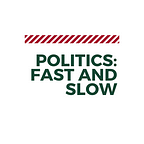More doesn’t equal better
3 min readSep 20, 2018
All too often, concepts — usually very flawed concepts — go undisputed. For example, we assume that a longer life has an inherent value, or that more university-goers is automatically a good thing. Some of these obsessions are automatic, borne of the natural human condition, but others are impressed upon us by politicians who manipulate the media and the news cycles.
